- Home
- Charles Bukowski
You Get So Alone at Times That It Just Makes Sense Page 10
You Get So Alone at Times That It Just Makes Sense Read online
Page 10
that.
the other letter was from the beautiful lady editor, neatly typed on
expensive stationery, and she said that she was no longer
publishing her literary magazine, that she had found God and was
living in a castle on a hill in Italy and helping the poor, and
she signed her famous name, with a “God Bless you,” and that was
that.
ah, you have no idea, in that dark freezing shack, how much I wanted to
be poor in Italy instead of Atlanta, to be a poor peasant,
yes, or even a dog on her bedspread, or even a flea on that
dog on that
bedspread: how much I wanted the tiniest
warmth.
the lady had published me along with Henry Miller, Sartre, Celine,
others.
I should never have asked for money in a world where millions of
peasants were crawling the starving
streets
and even some years later when the lady editor
died
I still thought her
beautiful.
about the PEN conference
take a writer away from his typewriter
and all you have left
is
the sickness
which started him
typing
in the
beginning.
everybody talks too much
when
the cop pulled me
over
I
handed him my
license.
he
went back
to radio in
the make
and model
of my car
and
get clearance on
my plates.
he wrote
the ticket
walked
up
handed it
to me
to
sign.
I did
he gave
me
back the
license.
“how come
you
don’t
say
anything?”
he asked.
I shrugged
my
shoulders.
“well, sir,”
he
said, “have
a
good day
and
drive
carefully.”
I
noticed
some sweat
on his
brow
and the
hand
that held
the
ticket
seemed to
be
trembling
or
perhaps
I
was only
imagining it?
anyhow
I
watched him
move
toward
his
bike
then I
pulled
away…
when confronted
with
dutiful
policemen
or
women
in rancor
I
have nothing
to
say
to them
for
if I
truly
began
it would
end
in
somebody’s
death:
theirs or
mine
so
I
let them
have
their
little
victories
which
they need
far
more
than
I
do.
me and my buddy
I can still see us
together
back then
sitting by the river
while shit-
faced on the
grape
and playing with the
poem
knowing it to be
utterly useless
but something to
do
while
waiting
the Emperors
with their frightened
clay faces
watch us as we
drink
Li Po crumbles his
poems
sets them on
fire
floats them down the
river.
“what have you
done?” I
ask him.
Li passes the
bottle: “they are
going to end
no matter what
happens…”
I drink to his
knowledge
pass the bottle
back
sit tightly upon my
poems
which I have
jammed halfway up my
crotch
I help him burn
some more of his
poesy
they float well
down
the river
lighting up the
night
as good words
should.
song
Julio came by with his guitar and sang his
latest song.
Julio was famous, he wrote songs and also
published books of little drawings and
poems.
they were very
good.
Julio sang a song about his latest love
affair.
he sang that
it began so well
then it went to
hell.
those were not the words exactly
but that was the meaning of the
words.
Julio finished
singing.
then he said, “I still care for
her, I can’t get her off my
mind.”
“what will I do?” Julio
asked.
“drink,” Henry said,
pouring.
Julio just looked at his
glass:
“I wonder what she’s doing
now?”
“probably engaging in oral
copulation,” Henry
suggested.
Julio put his guitar back in
the case and
walked to the
door.
Henry walked Julio to his car which
was parked in the
drive.
it was a nice moonlit
night.
as Julio started his car and
backed out the drive
Henry waved him a
farewell.
then he went inside
sat
down.
he finished Julio’s untouched
drink
then he
phoned
her.
“he was just by,” Henry told
her, “he’s feeling very
bad…”
“you’ll have to excuse me,”
she said, “but I’m busy right
now.”
she hung
up.
and Henry poured one of his
own
as outside the crickets sang
their own
song.
practice
in that depression neighborhood I had two buddies
Eugene and Frank
and I had wild fist fights with each of
them
once or twice a week.
the fights lasted 3 or 4 h
ours and we came out
with
smashed noses, fattened lips, black eyes, sprained
wrists, bruised knuckles, purple
welts.
our parents said nothing, let us fight on and
on
watching disinterestedly and
finally going back to their newspapers
or their radios or their thwarted sex lives,
they only became angry if we tore or ruined our
clothing, and for that and only for that.
but Eugene and Frank and I
we had some good work-outs
we rumbled through the evenings, crashing through
hedges, fighting along the asphalt, over the
curbings and into strange front and backyards of
unknown homes, the dogs barking, the people screaming at
us.
we were
maniacal, we never quit until the call for supper
which none of us could afford to
miss.
anyhow, Eugene became a Commander in the
Navy and Frank became a Supreme Court Justice, State of
California and I fiddled with the
poem.
love poem to a stripper
50 years ago I watched the girls
shake it and strip
at The Burbank and The Follies
and it was very sad
and very dramatic
as the light turned from green to
purple to pink
and the music was loud and
vibrant,
now I sit here tonight
smoking and
listening to classical
music
but I still remember some of
their names: Darlene, Candy, Jeanette
and Rosalie.
Rosalie was the
best, she knew how,
and we twisted in our seats and
made sounds
as Rosalie brought magic
to the lonely
so long ago.
now Rosalie
either so very old or
so quiet under the
earth,
this is the pimple-faced
kid
who lied about his
age
just to watch
you.
you were good, Rosalie
in 1935,
good enough to remember
now
when the light is
yellow
and the nights are
slow.
my buddy
for a 21-year-old boy in New Orleans I wasn’t worth
much: I had a dark small room that smelled of
piss and death
yet I just wanted to stay in there, and there were
two lively girls down at the end of the hall who
kept knocking on my door and yelling, “Get up!
There are good things out here!”
“Go away,” I told them, but that only goaded
them on, they left notes under my door and
scotch-taped flowers to the
doorknob.
I was on cheap wine and green beer and
dementia…
I got to know the old guy in the next
room, somehow I felt old like
him; his feet and ankles were swollen and he couldn’t
lace his shoes.
each day about one p.m. we went for a walk
together and it was a very slow
walk: each step was painful for
him.
as we came to the curbing I helped him
up and down
gripping him by an elbow
and the back of his
belt, we made it.
I liked him: he never questioned me about
what I was or wasn’t
doing.
he should have been my father, and I liked
best what he said over and
over: “Nothing is worth
it.”
he was a
sage.
those young girls should have
left him the
notes and the
flowers.
Jon Edgar Webb
I had a lyric poem period down in New Orleans, pounding
out these fat rolling lines and
drinking gallons of beer.
it felt good like screaming in a madhouse, the madhouse of
my world
as the mice scattered among the
empties.
at times I went into the bars
but I couldn’t work it out with those people who sat on the
stools:
men evaded me and the women were terrified of
me.
bartenders asked that I
leave.
I did, struggling back with wondrous six-packs
to the room and the mice and those fat rolling
lines.
that lyric poem period was a raving bitch of a
time
and there was an editor right around the
corner who
fed each page into a waiting press, rejecting
nothing
even though I was unknown
he printed me upon ravenous paper
manufactured to last
2,000 years.
this editor who was also the publisher and
the printer
kept a straight face as I handed him the ten to
twenty pages
each morning:
“is that all?”
that crazy son of a bitch, he was a lyric
poem
himself.
thank you
some want me to go on writing about whores
and puking.
others say that type of thing disgusts
them.
well, I don’t miss the
whores
although now and then one or another makes an
attempt to locate
me.
I don’t know if they miss all the booze and
the bit of money I gave them
or if they are enthralled at the way
I’ve immortalized them in
literature.
anyhow, they must now make do with
whatever men
they are able to scrounge
up.
—those poor darlings had no
idea…
and neither did I
that those ugly roaring nights
would be fodder
such as even
Dostoevski
would not shy away
from.
the magic curse
I never liked skid-row and so I stayed away from the soup
kitchens, the bloodbanks and all the so-called hand-
outs.
I got so god damned thin that if
I turned sidewise it was hard to see my shadow under a
hard noon sun.
it didn’t matter to me so long as I stayed away from the
crowd
and even down there it was a
successful and an unsuccessful
crowd.
I don’t think I was insane
but many of the
insane think
that
but I think
now
if anything saved me
it was the avoidance of the
crowd
it was my
food
still
is.
get me in a room with more than
3 people
I tend to act
ill
odd.
I once
even asked my wife: look, I must be
sick…perhaps I ought to see a
shrink?
Christ, I said, he might cure me
and then what would I
do?
she just looked at me
and we forgot the
whole
thing.
party’s over
after you’ve pulled off the tablecloth with
the full plates of food
and broken the windows
and rung the bells of
idiots
and have
spoken true and terrible
words
and have
chased the mob through the
doorway—
then comes the great and
peaceful moment: sitting alone
and
pouring that quiet drink.
the world is better without
them.
only the plants and the animals are
true comrades.
I drink to them and with
them.
they wait as I fill their
glasses.
no nonsense
Faulkner loved his whiskey
and along with the
writing
he didn’t have
time
for much
else.
he didn’t open
most of his
mail
just held it up
to the light
and if it didn’t
contain a
check
he trashed
it.
escape
the best part was
pulling down the
shades
stuffing the doorbell
with rags
putting the phone
in the
refrigerator
and going to bed
for 3 or 4
days.
and the next best
part
was
nobody ever
missed

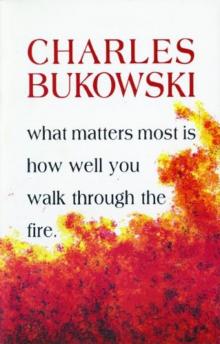 Burning in Water, Drowning in Flame
Burning in Water, Drowning in Flame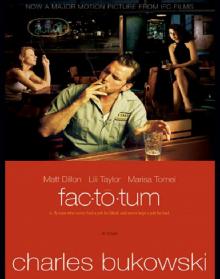 Factotum
Factotum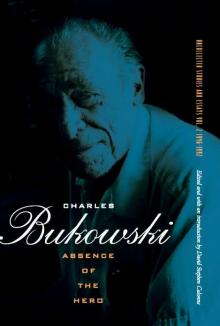 Absence of the Hero
Absence of the Hero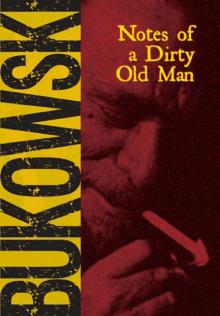 Notes of a Dirty Old Man
Notes of a Dirty Old Man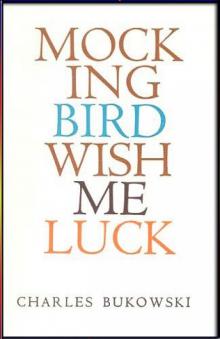 Mockingbird Wish Me Luck
Mockingbird Wish Me Luck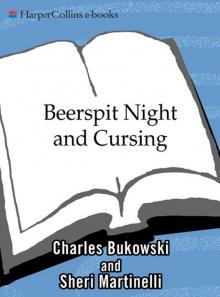 Beerspit Night and Cursing
Beerspit Night and Cursing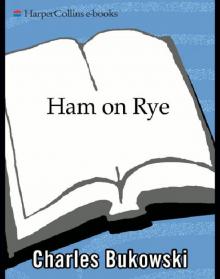 Ham on Rye: A Novel
Ham on Rye: A Novel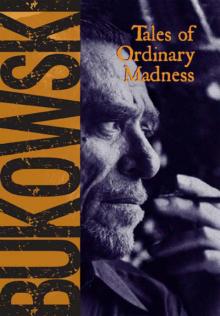 Tales of Ordinary Madness
Tales of Ordinary Madness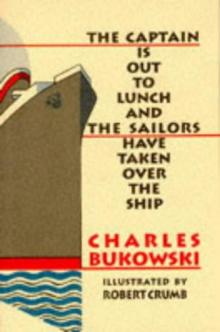 The Captain Is Out to Lunch and the Sailors Have Taken Over the Ship
The Captain Is Out to Lunch and the Sailors Have Taken Over the Ship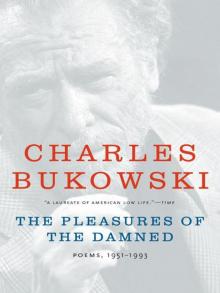 The Pleasures of the Damned
The Pleasures of the Damned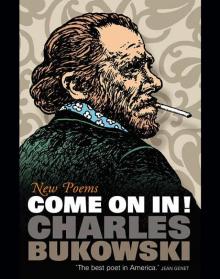 Come on In!
Come on In!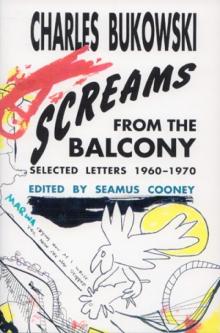 Screams From the Balcony
Screams From the Balcony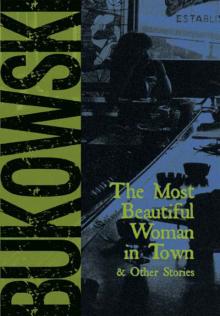 The Most Beautiful Woman in Town & Other Stories
The Most Beautiful Woman in Town & Other Stories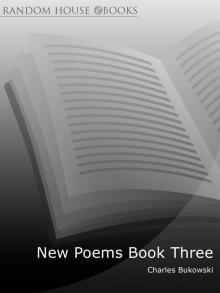 New Poems Book 3
New Poems Book 3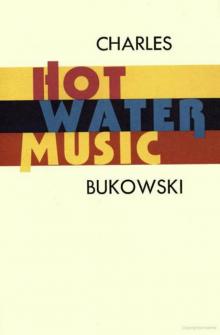 Hot Water Music
Hot Water Music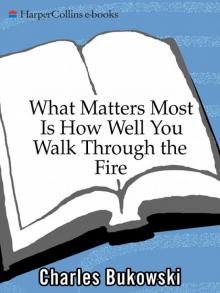 What Matters Most Is How Well You Walk Through the Fire
What Matters Most Is How Well You Walk Through the Fire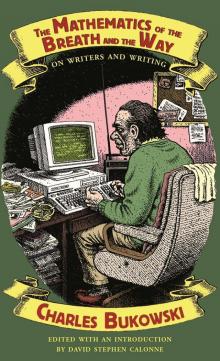 The Mathematics of the Breath and the Way
The Mathematics of the Breath and the Way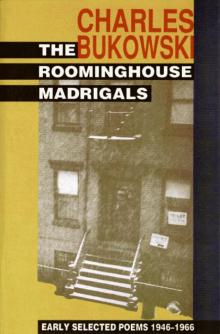 The Roominghouse Madrigals: Early Selected Poems, 1946-1966
The Roominghouse Madrigals: Early Selected Poems, 1946-1966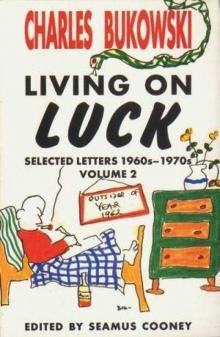 Living on Luck
Living on Luck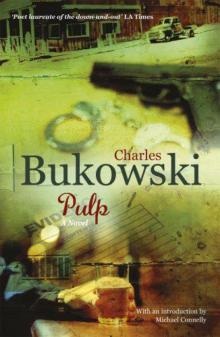 Pulp
Pulp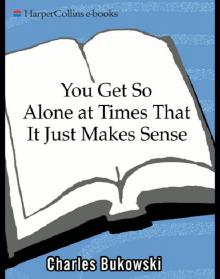 You Get So Alone at Times That It Just Makes Sense
You Get So Alone at Times That It Just Makes Sense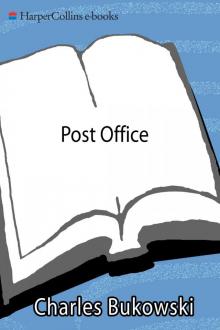 Post Office: A Novel
Post Office: A Novel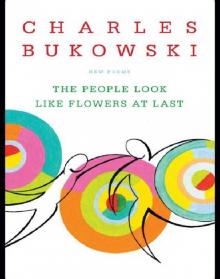 The People Look Like Flowers at Last: New Poems
The People Look Like Flowers at Last: New Poems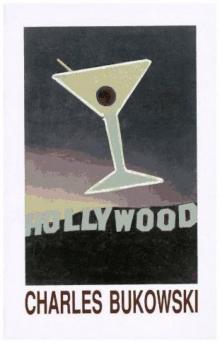 Hollywood
Hollywood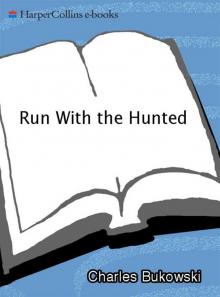 Run With the Hunted: A Charles Bukowski Reader
Run With the Hunted: A Charles Bukowski Reader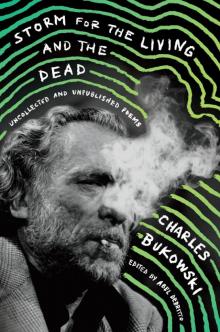 Storm for the Living and the Dead
Storm for the Living and the Dead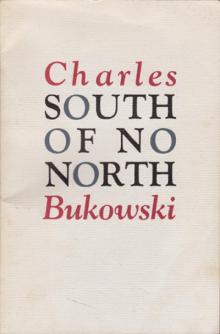 South of No North
South of No North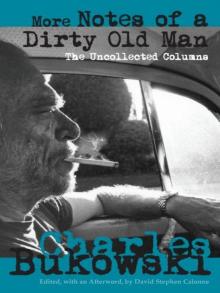 More Notes of a Dirty Old Man: The Uncollected Columns
More Notes of a Dirty Old Man: The Uncollected Columns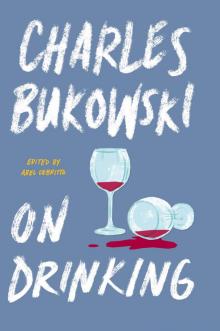 On Drinking
On Drinking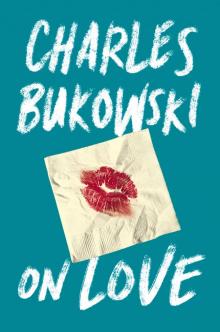 On Love
On Love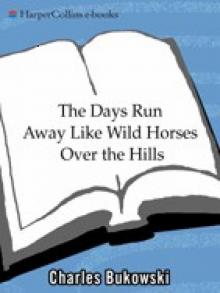 The Days Run Away Like Wild Horses
The Days Run Away Like Wild Horses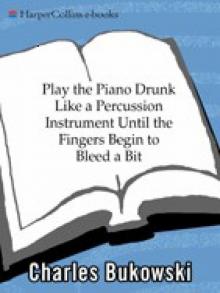 Play the Piano
Play the Piano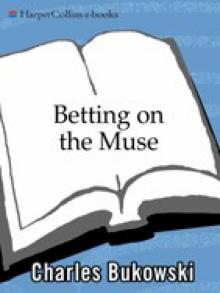 Betting on the Muse
Betting on the Muse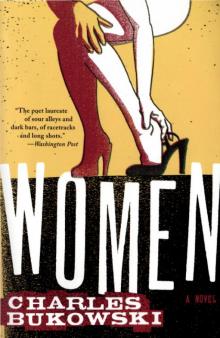 Women
Women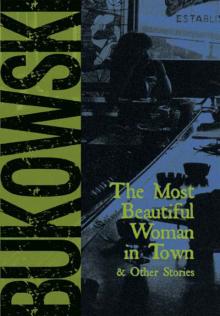 The Most Beautiful Woman in Town
The Most Beautiful Woman in Town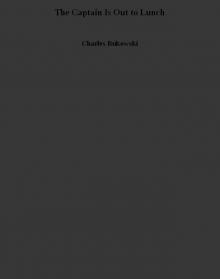 The Captain Is Out to Lunch
The Captain Is Out to Lunch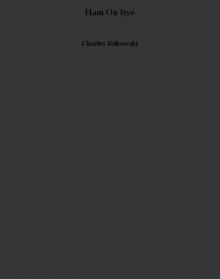 Ham On Rye
Ham On Rye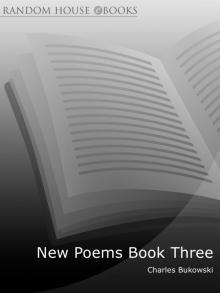 New Poems Book Three
New Poems Book Three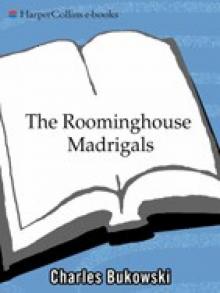 The Roominghouse Madrigals
The Roominghouse Madrigals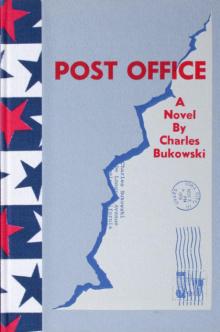 Post Office
Post Office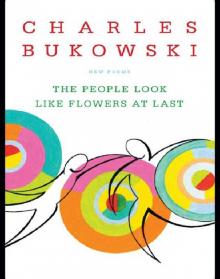 The People Look Like Flowers At Last
The People Look Like Flowers At Last